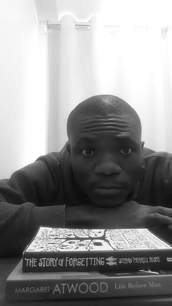 Eze Ifeanyichukwu Peter studied Philosophy at the University of Nigeria, Nsukka. His works have appeared on Africanwriter, Afridiaspora, Brittlepaper, Black Boy Review, The Kalahari Review, and Tuck Magazine. His piece, 'Life Deferred' was in the top four of the Igby Prize for non fiction, January, 2017. Monks Three nights ago.
He sighs, and throws two pills of Ibuprofen tablets into his mouth accompanying it with a gulp of water. “The crusher was clogged," he begins to say. "Dusts, red and white clouded the factory. We dug out lumps of mud earth before the machine started rolling again." He takes another gulp. “And it seems my body pains especially the one residing in my belly is becoming resistant to painkiller drugs.” “Maybe it’s time you see a doctor. The bellyache, especially,” you say. “Yes. But I have to travel all the way to Dubai since my insurance card doesn’t work here in Al Ain. We keep telling the foreman. He says he has reported to the management. Nothing else has been done.” “Pity.” “One has to save cost, you know. I will do with the drugs for now. I just need rest.” Then You are awake. The whining of the two-tier bed persists. You call out, “Kito!” “Kito!” You fling myself out of the bed. He is doubled over, eyes closed, mouth open but no words are coming out as they are held down somewhere inside of him, beneath where his hands are clutching at his belly as if stopping something from erupting. “Do you need the drug?” “Have you taken them?” Your voice rings. * Last night. His voice comes out in a whisper like he is telling a secret, “Don’t worry,” he says in between the rising and falling of his shrinking chest. He blinks as the word worry drops out of his mouth. Before your eyes meet his, they travel to the tube attached to a bag half filled with tea coloured liquid whose other end is between his legs, hiding under the white sheet, and on to the zigzag lines bobbing steadily on the screen by the side of the bed. You try to hold his stare but his eyes lay in their sockets as though they are too small for them. “You will be fine,” yousay. “I have used all my money for this treatment,” he says. His breath pauses and his belly sinks. “But the hospital has been nice. It’s good you left the factory. I don’t have a university degree like you.” “Thank you. I’ll come and see you once I get time. You know how it is with me too. I’m trying to settle down in the new job.” “Okay.” * Morning New job. Thursday. This is the fifth job. You think you have finally gotten what you wanted. You are on it, slow and steady. You enter the class to a curious disinterestedness, of eyes that skim you a look, and look away as though you are a little distraction. You write on the board. They dart glances of what-is –he-trying-to-do? They look away, shooting out throaty lines of English: “His skin is black.” “Maybe he needs washing, don’t you think?” “His nose is not like ours.” “Look at his ears.” “And his hair.” “Good morning,” You say. “Where are you from?” “Do you speak Arabic?” “Please, what’s your name?” Their voices attack your ears. Competing. Then they forget about you like a negligible speck of inconvenience on the yoke of their comfort. And their legs carry their slim bodies, white, almost transparent like breakable glasses, here and there, hiding and seeking, climbing and jumping, up and down their chairs and desks, and throwing imaginary leather balls at each other, their shrieks clashing against their competing decibels so that in the mix, there is a scuffle of two bodies; one mouth sinks its teeth into the arm of another who charged, punched the other to the floor, and punches away. Your palms slam the desk before you. Your voice rises above their din. Order. Silence breezes in. Brief. Disorder chases it away with a whimper. You don’t hear or see your hand fling to pay heed to your rage. The school nurse looks at the skin of the child, aghast, waves you away with a frown, blurting out, “Khallas.” “Khallas.” Finish. Finish. And the principal’s offended voice sprints out from her office, finds you, barks at you, and chases you out of the school premises. * Afternoon. Jobless. Again. Your mind is your only audience. “What now?” “I don’t know, really.” It’s May. Summer is rearing its head. The air here in the Emirates blows hot like breath from hell. The sky is clear. Always. If only your head is clear too, then you can think properly. She is aware. Her lone bright eye stares without cease to suck out the fats of your thoughts by hugging you with wetness. She doesn’t care that you have been standing here, waiting for the traffic to signal You to walk across the zebra crossing. Your legs want to curl under You. Your back is weeping. And your eyes are falling into your head because your stomach is grumbling. Horns hoot, engines buzz, lights flash- red, yellow, and green. I walk across to the other side into a cafeteria. Smells of frying and burning greet me. No clanking. Eyes of owners in white tunics look your way except two fellows sitting face to face, sipping coffee. One burly, and the other is thin and bald. Your order is here- a piece of flat bread and soup. You scoop enough soup with each pinch, and munch away. Your morning replays itself on every soft cracking of the dry puffs in your mouth. A glass of water pushes down everything. Your thought follows, but refuses to stay there. “We need labourers,” says the burly one. His paunch is forcefully imprisoned by his shirt. On it is boldly written: I am the boss. The thin one grimaces and scratches the hairless spot of his head as if to resurrect invisible hairs of ideas. “Then we go for Pakistanis or Bangladeshis.” He pulls a sheet of paper handkerchief from the pack on the table and makes some notes. “But the agents are demanding more fees.” He shows the other what he has written. The burly one belches loudly, “No!” And after a slurp, “I don’t want to lose this contract, you know.” His voice drawls, “A-fri-ca-nos! They are stronger and can work longer hours under the sun.” His face smiles. Lazily. He pours his eyes on what the other has written, “We can fix that.” His eyes brighten with a flash of Eureka-moment. Back on at the roadside. You stand amidst bodies of white-robed Pakistanis, brown around their necks and cuffs, Bangladeshis, gruffy in their work-stained coveralls and dusty safety boots, and Indians wearing moustaches of calligraphed birds in flight. The smell of garlic and sweat pinch your nostrils. Eyes like balls in a scummy puddle smile at you with a flash of nicotine-stained teeth. Its owner spits out a ball of green which bounces off to the middle of the road and gets picked by tyres until its trace is lost on the asphalt. It will not fade out into nothingness. Your memory. Not now. Oh! These bits: factory- your body marrying dust, shovels, and sledge hammers; pick axes, wheelbarrows, and bricks, giving birth to waist pain. But your biceps have bulged to enviable proportions. It’s the bowels and shits. Brush. Scrub. Clean. Mop. And the perfume of smells- sour, rotten, sticky all gathere on the doors of your nostrils. And stay there. Or they just hang on your skin. You want to board the next flight home. Yes. Home is where the temperature is not an eternal high of forty degrees and above. Home is where the sky has the leisure of sucking up all the water in the land until she becomes drunk with heaviness, sparks across, and belches, then pours down, drumming on rooftops like fidgety fingers, and dancing on the ground excitedly. Her breath is soft air that seeps through trees flushed with green. And the trees are swaying in praise. Home is where mama’s voice is pleading with you to be patient. No, you don’t understand mama. No. You want to catch Bob, peel off his skin of lies, and leave him bare and red with purity. You are dialling his number. He doesn’t pick. He calls me with another number and says he can’t hear what you are saying. He hangs up. You dial. It hums dead. Forever. You know you can't catch him. You can’t. The money is gone. You are a finished business. “My agent promised me a better job and salary. I paid a lot of money to come here too.” Kito says. “This one is even my friend.” “In my case, it was my cousin. “ “You cousin?” “Yes. Guy, na UAE be this. Na so we see am. You don come be say you don come.” “It will be a miracle if he survives, “says the doctor. “His kidneys are damaged. The finality in his tone shatters any hopes you want to muster. It’s seven hours of flight away from Nigeria. You are jobless. Your friend is dying. You can’t help but ask yourself, "Why am I here?" Oh! You want these voices in your head to shut up. Shut. Up. Bus arrives after an hour. You sit next to a fellow black with headphones on. He smiles a welcome note, nodding his dreadlocked head to the sounds banging in his ears. You shake hands. His palm is rough as sandpaper. “I don’t shake hands,” Kito tells me. “I just nod or wave my hand.” This fellow here doesn’t appear to care if his rough palm tells the kind of job he does. “No,” says Kito. “I don’t want to make the other person feel the displeasure of your work-hardened palms.” * Labour Camp Here again. It's 3 pm. Large buses like big boxes on wheels are packed along adjacent to the entrance gate. Bodies alight, squint, and trudge to their rooms. It is prattling alive with voices prodding through the thicket of nonchalance in the room where you have a space. "My people think say I dey earn better money. Always dem dey say make I send money." "No be small thing. Me sef, I borrow money send to my people." "Hmm. I dey find am hard to save sef. How much person wan save? How much you wan send? And you go feed." "And my last month salary no complete sake of say I argue with supervisor. I tell am say I get chest pain and I wan rest. Him no gree. But me no send am. I just go rest my thing." "Imagine oo. My own no go complete this month too. Tomorrow I wan stay for house. My waste pain dey disturb me." You listen. You don’t listen. You unbutton your shirt like an unwanted flesh that needs discarding, and allow the unnatural air of the buzzing air conditioner to collapse on you. You climb into your bunk- your room in this room of five bunks for ten persons, enclosed in it by walls of wrappers. You try to sleep accompanied by the further talk of hungry penises crying for unavailable vaginas. In the folds of your sheets, a reddish brown rests motionless. Your hand reaches and grasp it between the thumb and index fingers, smashing and rubbing to shreds until the red stain disappears. The smell floats about for a while. Some roach is scurrying leisurely on the roof of your bunk. You let it be. You don’t want to instigate the other roaches to come out from their safe places around, and no less do you want to disturb the Bunkie on top. Hey, but Kito is not there. He is not here to tell you how he has not had sex since he left Nigeria. Two years now. “I miss my girlfriend. My wife to be. I am saving for our marriage,” he says. Your bed quakes under me like it is tired of my weight. No. It is doing what other beds are doing- quaking under the weights of bodies. This is music, and its rhythm drives me to sleep. Oh, sleep is the place to go to when your eyes close. You are happy. Kito is here. His head is thrown backwards. His eyes are thin lines on his laughing face. The laughter chokes you with pleasure. Then he says, “Guy, no worries.”He stands tall like a silhouette, close to me. You hold hands and squeeze. A smile sparkles through your eyes, and lightens up the streets. No eyes stare at you like some translucent appearance to be seen through, nor are eyebrows raised in disappointment for not being able to; no causing lips wrap you up into a capsule of uselessness to be swallowed out of use, and no shade to mark you apart. Here, you are not a definition, a colour of unrefined speck. * Night It’s Thursday. Tomorrow is weekend. Break. You stroll pass married and unmarried bachelors, glued to the screen of their devices, chatting up concubines, wives and girlfriends in faraway places to fill the empty spaces of their absence. Others thrust their sex starved penises into available anuses, groaning out suppressed angst and pleasure. Those who can afford have left to abandon their bodies to the ladies of the night. Empty bottles lay like morsels of leftover meals, forgotten by their drinkers, who are floating in the glee of forgetfulness without the least guilt of transgression against the sign on the gate: ALCOHOL IS NOT ALLOWED HERE. But Kito is being eaten away. What did the doctor even say? It’s 11 pm. 8 pm on the side of mama. You dial her number. “How is Dubai?” Her voice, tired, steadies to normal. Mama always forgets. You want to say, It’s United Arab Emirates, Mama. Dubai is just one of the Seven Emirates. And you am in Al Ain, another Emirate. But you just say, “It’s fine, Mama." “The night has come earlier,” she says. It has been raining all day. Business is low key. She thanks you again for the money I sent last time. She has bought more goods, and is hoping to expand her business. “Tomorrow is another day. Tomorrow will be better,” she declares. Now her voice is singing in my ears, dancing down my stomach. You have missed her Fufu and Bitter dearly. “Tomorrow will be better,” you hear myself say out loud. No. You want to go home. You keep walking as if home is a few paces away.
0 Comments
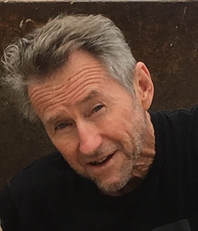 Richard C Rutherford is previously published in Fiction Southeast, Stone Coast Review, Hypertext, LAROLA, Red Fez, Squalorly, The Tishman Review. Upcoming in The Writing Disorder, and Visitant. He has a large collection of stories, including phone size. The Off Season When Santa woke up, he lay still, as was his custom, and took account of his situation. He was in his home, in his bed. The phone was ringing. It was morning. Wincing back the familiar headache, he made a mental note (yet again) to cut back on the Schnapps.
“Well Nickie, old boy, “he said to himself. “It’s another fine day and you don’t have to worry about fucking Christmas for another nine months.” He groaned with loud satisfaction, rolled over on his side, swung his legs off the bed and sat up. Lifting his arm, he turned his head and sniffed deeply. Rank pits. He would take a shower when he damned well pleased. He had to piss and was half-hard. With pride of ownership, he held his cock in his left hand, smiling through his fading headache. Last night, the Tooth Fairy had spent a righteous night: him bellowing and her screaming out their orgasms. He reached down to the floor for his lederhosen and pulled them on. “Nickie-boy, you gotta’ start using condoms. No telling how long she lingers at all those beds she sneaks around.” He combed his beard with his fingers pensively. A girl with her inclinations could spoil his sack of goodies. Scratching his belly absently, he stood and slid his feet into his slaps. “Goddamn bunions.” Hobbling for the first few steps, stiff-backed and bent over, he headed down the hall to the kitchen. The phone rang again. Eggs and bacon sounded good, but there were fresh mouse tracks in the frying pan. All the dishes were dirty and he was out of paper plates. Cold cereal in a coffee cup was an option, but… He sighed. It would take forever to get his stomach full one cup at a time. He should never have let Claudia get a job. She’d met some goofball at her twelve-step meetings who’d sold her on multi-level marketing. Now, she was always off at trade shows, showing product. Shit. Everybody knew what a loser’s scam that was. He’d talked to her until he was blue in the face. But she ignored him. Now they had inventory all over the workshop—and invoices! Who the hell needed invoices? He started to clear off the countertop; dishes in teetering stacks, take-out boxes, beer bottles. A mouse skittered behind the toaster. “Fuck!” He roared, jumping back. He picked up a barbeque fork and stabbed around behind the toaster. He yelled in the direction of the mouse, “I move more fucking product than anyone on the face of this fucking planet!” A beer bottle fell over, the neck broke off, and the phone rang again. “Fucking bitch! I should never have bought her those god-damned teeth!” He stood in the middle of his semi-modern kitchen—flourescent lights in a dropped ceiling, large pantry, Jenn-air, Viking, a dishwasher, microwave, marble countertop. It had cost a fortune to ship all these improvements. The installation had taken months. Between doing the kitchen remodel and Claudia using the workshop for her warehouse/office, the elves were getting bitchy—talking union. Who needed 400 cases of motor oil that you could also use to brush your teeth? Again, the phone started ringing. His lower lip trembled. There was a half-bottle of Jack in the cupboard, but he told himself last night that he was gonna’ work in the garden this morning, dig the warm earth, plant peppers, radishes and marigolds. He wanted to believe that connecting with the simple things in life would restore him. And in the middle of good intent he remembered a text his bookie had sent: The Knicks had Boston at home in The Garden this week—plus 3 ½. Garnett was injured and Shaq still couldn’t make a free throw. No. Today, he was going to start putting his life back together. After only a slight pause, the phone started ringing again. He glanced at it the way one would at a loaded gun. He knew who it was and what they wanted. He owed a lot of money. The trouble was that he’d never held that money in his hand—neither the wagers nor the winnings. He never saw the money, just like he never saw the faces of the little children. It was all abstract. Winning didn’t make him happy and losing didn’t bring him down. The only thing he ever felt was the jingle—the anticipation of placing a bet. How had it come to this? A hundred years ago he was the only man in the sky at night. He made toys of wood—there was no plastic. It all used to be so simple. Ignoring the phone, Santa took down the bottle of Jack and headed for the garden.  Tracy E Antoine is a up and coming new writer. In high school, Tracy began expressing her emotions through poetry and short stories. Dealing with the loss of her younger brother, during Hurricane Katrina, she began writing detail accounts of her life. Tracy also found she had an interest behind the camera. She took her love for writing and photography to the next level and enrolled at Full Sail University to pursue her Bachelor's degree in Creative Writing for Entertainment. After she graduates in 2019, she plans to start her own entertainment firm, that will publish novels and create films. You can view some of her most recent photography at www.theteafirm.net or connect with her on LinkedIn at https://www.linkedin.com/in/tracy-e-antoine. The Wrong Hitchhiker |
Categories
All
|
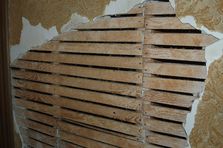
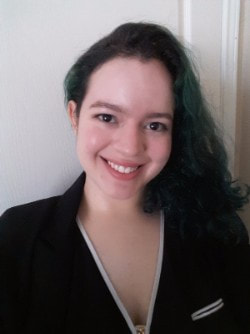
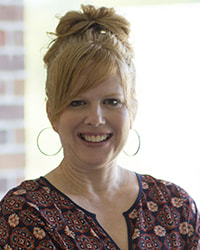
 RSS Feed
RSS Feed